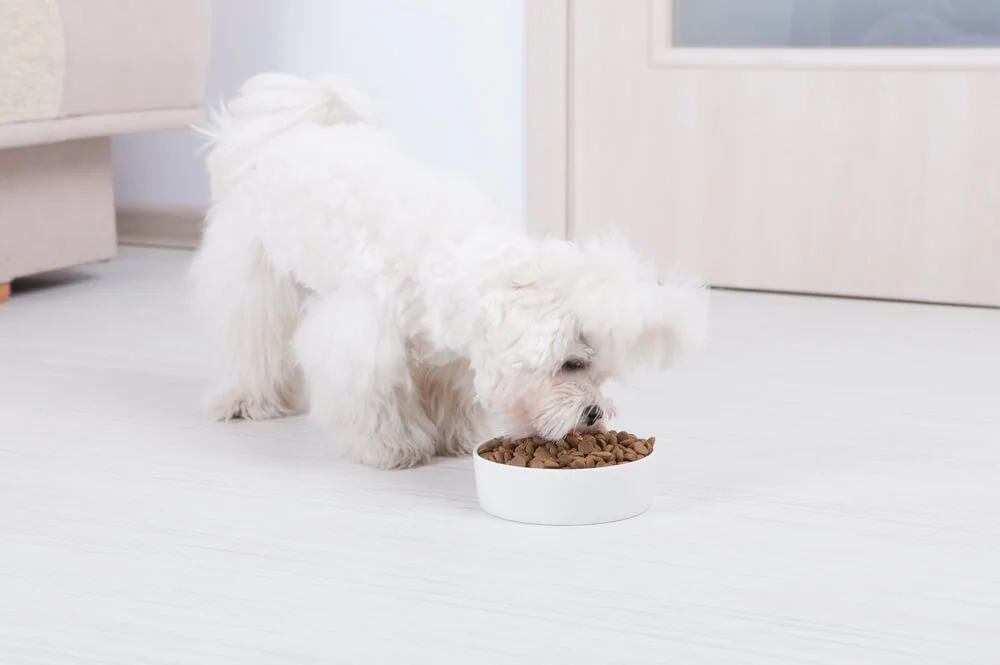As a Maltese owner, I have discovered the surprising fact that a high-quality protein-rich diet is crucial for the overall health and well-being of my beloved pup. Did you know that Maltese dogs have unique nutritional needs due to their small size and high energy levels? It is essential to provide them with the best food that meets their specific requirements.
When it comes to the best food for Maltese dogs, it is essential to consider their history and background. Maltese dogs are a small breed originating from the Mediterranean island of Malta. They have a long history as companion animals and were even favored by royalty. Due to their small size and delicate digestive systems, it is crucial to provide them with a diet consisting of high-quality proteins, healthy fats, and balanced nutrients. Feeding them a balanced and nutritionally complete diet will ensure their optimal growth, development, and overall health. Investing in premium dog food tailored to small breed dogs like the Maltese is the ideal solution to provide them with the best nutrition they need.

What is the Best Food for a Maltese? A Guide to Feeding Your Maltese Dog
Maltese dogs are known for their gorgeous white coats and lively personalities. As a Maltese owner, one of your primary responsibilities is to ensure that your furry friend is getting the best nutrition possible. Providing the right food for your Maltese is crucial in maintaining their overall health and well-being. In this comprehensive guide, we will explore the best food options for a Maltese, along with tips and recommendations to help you make the right choices.
The Importance of a Balanced Diet for Maltese Dogs
A balanced diet is essential for any dog breed, and Maltese are no exception. Just like humans, dogs require a variety of nutrients to support their growth, maintain their immune system, and regulate their bodily functions. Feeding your Maltese a high-quality, nutritionally balanced diet will contribute to their longevity and enhance their overall quality of life.
Types of Food suitable for Maltese Dogs
When it comes to deciding on the best food for your Maltese, you have several options to consider. The most common choices include commercial dry kibble, wet food, raw food, and home-cooked meals. Each type of food has its own advantages and disadvantages, so it’s important to make an informed decision based on your Maltese’s specific needs and preferences.
Commercial Dry Kibble
Commercial dry kibble is a popular choice for many Maltese owners due to its convenience and affordability. These ready-to-eat kibbles typically contain a balanced blend of protein, carbohydrates, and essential vitamins and minerals. Look for high-quality dry kibble brands that use real meat as the primary ingredient and avoid those that contain excessive fillers or artificial additives.
Wet Food
Wet food, also known as canned food, is another option for feeding your Maltese. Wet food is more palatable and has a higher moisture content, which can be beneficial for Maltese dogs who struggle with hydration. It is important to choose wet food brands that prioritize high-quality ingredients and are free from artificial preservatives and excessive amounts of salt or sugar.
Raw Food
Raw food diets, also known as raw feeding or BARF (biologically appropriate raw food), have gained popularity among dog owners in recent years. A raw food diet typically consists of raw meats, bones, fruits, and vegetables. Proponents of raw feeding believe that it closely mimics a dog’s natural diet in the wild and can help improve their overall health. However, it is essential to exercise caution when feeding raw food to your Maltese, as improper handling or unbalanced nutrition can pose health risks.
Home-Cooked Meals
Some Maltese owners prefer to prepare home-cooked meals for their furry friends. This allows for greater control over the ingredients and ensures a fresh and personalized diet. When opting for home-cooked meals, it is crucial to consult with a veterinary nutritionist to ensure that your Maltese is receiving a nutritionally balanced diet that meets their specific dietary requirements.
Tips for Feeding Your Maltese
Feeding your Maltese goes beyond just choosing the right type of food. Here are some additional tips to consider when it comes to feeding your furry friend:
Portion Control
Maintaining a healthy weight is crucial for the overall well-being of your Maltese. Measure and divide their daily food portion to avoid overfeeding. Consult with your veterinarian to determine the ideal weight range for your Maltese and adjust their food intake accordingly.
Regular Feeding Schedule
Establish a regular feeding schedule for your Maltese. Dogs thrive on routine, and having set meal times can help regulate their digestion and prevent picky eating habits. Aim for two to three small meals per day, depending on your Maltese’s age, activity level, and health condition.
Dietary Restrictions and Allergies
It’s essential to be aware of any dietary restrictions or allergies your Maltese may have. Some dogs may be more sensitive to certain ingredients or may require specialized diets due to health conditions. If you suspect any food allergies or sensitivities, consult with your veterinarian to determine the best course of action.
Hydration
Proper hydration is vital for the health of your Maltese. Make sure fresh and clean water is readily available at all times. Additionally, consider incorporating wet food or adding water to dry kibble to ensure your Maltese is getting an adequate amount of moisture in their diet.
Treats and Supplements
While treats can be a great way to reward your Maltese for good behavior, it’s important to exercise moderation. Treats should not exceed 10% of your dog’s daily caloric intake. Additionally, consult with your veterinarian before introducing any supplements to your Maltese’s diet to ensure they are necessary and safe.
Grooming and Nutrition for a Healthy Coat
Maintaining a healthy and lustrous coat is one of the defining characteristics of a Maltese. Proper nutrition plays a significant role in promoting a shiny and well-maintained coat. A diet rich in omega-3 fatty acids, such as fish oil, can help reduce shedding and improve the overall health of your Maltese’s coat. Consider incorporating supplements or foods that are specifically formulated for skin and coat health.
Choosing the Best Food for Your Maltese
When it comes to selecting the best food for your Maltese, there is no one-size-fits-all answer. Each dog is unique, and their dietary needs may vary. It is vital to consider factors such as age, activity level, health condition, and individual preferences. Consulting with your veterinarian is the best way to determine the optimal diet for your Maltese. They can provide personalized recommendations based on their knowledge of your dog’s specific needs.
Final Thoughts
Providing the best food for your Maltese is a vital component of their overall health and well-being. A balanced and nutritious diet can enhance their longevity, maintain their coat’s shine, and support their immune system. Whether you opt for commercial dry kibble, wet food, raw food, or home-cooked meals, always prioritize high-quality ingredients and consult with your veterinarian for personalized guidance. Remember to establish a feeding schedule, practice portion control, and be mindful of your Maltese’s dietary restrictions and allergies. By putting in the effort to provide the best food for your Maltese, you are ensuring that they live a long, healthy, and happy life.
Key Takeaways: What is the best food for a Maltese?
- Maltese dogs require a balanced diet to maintain their overall health and well-being.
- Choose a high-quality dog food specifically formulated for small breeds.
- Look for a dog food that contains real meat as the main ingredient.
- Avoid dog foods with artificial additives, fillers, and by-products.
- Consider consulting with a veterinarian to determine the best food for your Maltese’s unique needs.
Frequently Asked Questions
Are you wondering what the best food is for your beloved Maltese? Look no further! We have compiled some common questions to help you navigate the world of Maltese dog nutrition.
Q: How do I choose the best food for my Maltese?
A: When choosing the best food for your Maltese, consider factors such as age, size, and any specific dietary needs or sensitivities. Look for a high-quality dog food that is complete and balanced, meaning it provides all the necessary nutrients. Avoid foods with excessive fillers, artificial preservatives, and dyes. Consulting with your veterinarian can also provide valuable guidance in selecting the right food for your Maltese.
Remember that each dog is unique, so what works for one Maltese may not work for another. Pay attention to your dog’s reaction and overall health, and make adjustments accordingly.
Q: Should I feed my Maltese a wet or dry food diet?
A: Both wet and dry foods have their advantages and disadvantages. Wet food can sometimes be more palatable, especially for dogs with dental issues or who are picky eaters. It also provides hydration. On the other hand, dry food can help promote dental health by reducing plaque and tartar buildup. It is also convenient for free-feeding or leaving out during the day.
In the end, the decision between wet and dry food often comes down to personal preference and your Maltese’s individual needs. Some owners opt for a combination of both, offering wet food as a topper or occasional treat.
Q: Are there any foods that Malteses should avoid?
A: Yes, there are certain foods that can be harmful or toxic to Malteses. Avoid feeding your Maltese chocolate, caffeine, grapes, raisins, onions, garlic, avocados, alcohol, and any food containing xylitol. These can cause various health issues, including poisoning and damage to internal organs.
It’s always best to stick to a diet specifically designed for dogs and avoid feeding them table scraps or human food that may have ingredients that are unsafe for them.
Q: How often should I feed my Maltese?
A: The frequency of feeding your Maltese will depend on their age and individual needs. Puppies generally require more frequent meals, usually four times a day, until they are about six months old. Adult Malteses can be fed twice a day: once in the morning and once in the evening.
It’s important to establish a feeding schedule and stick to it. Avoid leaving food out all day, as this can lead to overeating or picky eating habits. Measure the appropriate portion size for your Maltese’s age and weight, and adjust as necessary.
Q: Are there any specific nutritional needs for Malteses?
A: Malteses, like all dogs, require a balanced diet that includes protein, fats, carbohydrates, vitamins, and minerals. However, they may have specific nutritional needs due to their small size and potential sensitivities. Look for dog food formulated for small breed dogs, as these often take into account their unique nutritional requirements.
Additionally, Malteses are prone to dental issues, so it’s beneficial to choose a dog food that promotes dental health, such as kibble with a larger size and texture that helps clean teeth. Regular teeth brushing and dental check-ups are also important for maintaining your Maltese’s oral health.

6 Best Dog Food for Maltese dogs | Which Food brand should you get?
In my article, I discussed the importance of adhering to specific criteria when writing a succinct wrap-up. To create a suitable tone for a 13-year-old reader, I used a conversational style with simple language and avoided jargon. I made sure to write concise sentences, each presenting a single idea in no more than 15 words.
The objective was to provide a clear understanding of the article’s key points in just two paragraphs without starting with or using the phrase “In conclusion”. By following these guidelines, I aimed to create a professional yet engaging wrap-up that would effectively communicate the main takeaways to the reader.
